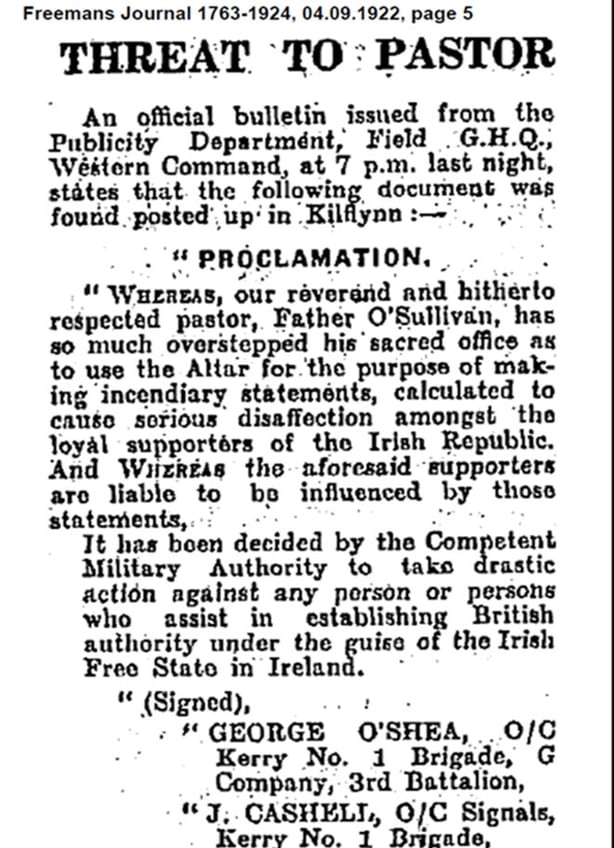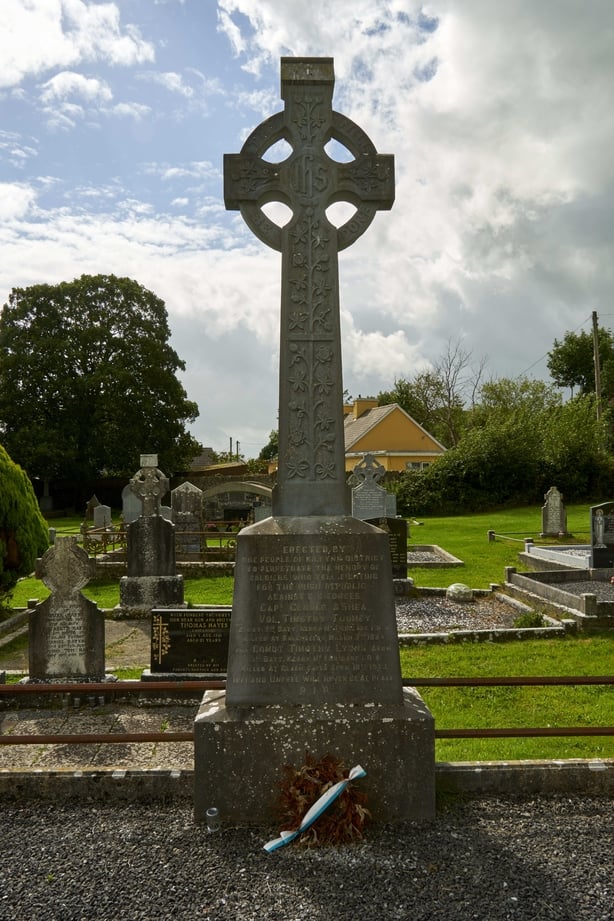By Richard McElligott, Dundalk Institute of Technology
I come from Kilflynn, a small village in rural North Kerry whose history is interwoven with the Ballyseedy massacre of March 7th 1923. Stathis Kalyvas, the noted scholar of civil wars, argues such conflicts are the cruellest because the violence engendered results from local factors that drive the struggle's bloody dynamics. Kilflynn’s experience can likewise be seen as a microcosm of the complex effects and legacy the Civil War left on Irish society as a whole.
As elsewhere, the Treaty’s terms proved hugely divisive. When the Kilflynn IRA took a vote on the issue one member, Stephen Fuller, recalled that of the 100 men enlisted 'nearly all went Free State’, leaving just 34 behind. A fascinating illustration of how the war was fracturing this community came in September 1922 when George O'Shea, captain of the Kilflynn Company, posted a proclamation in the village declaring that ‘drastic action’ was to be taken against the local priest and any other ‘persons who assist in establishing British Authority under the guise of the Free State in Ireland’.

However, by the early spring of 1923 O’Shea’s unit was reduced to an existence of evasion due to the intensity of National Army sweeps and round-ups. On 23 February, O’Shea, Fuller, and Timothy Twomey were captured at their dug-out outside the village. Brought to Tralee's Ballymullen Barracks, the four were interrogated by Colonel David Neligan who was handpicked by Michael Collins to oversee the Army’s intelligence network in Kerry.
This ‘interrogation’ amounted to being blind-folded and having their arms tied at their side, as their body and limbs were smashed with hammers. An eyewitness remembers some prisoners being thrown back to their cells so spattered in their own blood, their shirts clung to their backs. The night after the IRA mine atrocity at Knocknagoshel, Fuller, O’Shea and Twomey were among nine prisoners brought from their cells, given cigarettes and informed by Captain Ned Breslin, as Fuller later testified, that ‘we were to be blown to atoms as a reprisal for the deaths of the Free State officers killed in Knocknagoshel’.
We need your consent to load this rte-player contentWe use rte-player to manage extra content that can set cookies on your device and collect data about your activity. Please review their details and accept them to load the content.Manage Preferences
From RTÉ Radio 1's Drivetime, Barry Lenihan reports on the centenary of the Ballyseedy massacre in Co Kerry
The horror that transpired next among the tenebrous trees of Ballyseedy Wood encapsulated the crescendo of depravity that marked the last stage of Ireland’s Civil War in Kerry. Fuller later wrote how he famously ‘escaped death by a miracle’. Yet his friends, O’Shea and Twomey, were now nothing but pieces of flesh festooning branches and pulverised bodies being shovelled back into coffins by their fellow countrymen, whose nerves for this gruesome task had to be fortified with drink. O’Shea’s death certificate described how he suffered ‘shock, haemorrhaging and a fractured skull’.
Fuller received severe injuries. He recalled: ‘All the skin was burnt off my hands and the skin burnt off the back of my legs. My hands were tied behind my back and met the full force of the explosion’. Yet he regained enough composure after being blown clear of the blast to escape undetected in the pre-dawn darkness, eventually reaching the safety of a local home.
We need your consent to load this rte-player contentWe use rte-player to manage extra content that can set cookies on your device and collect data about your activity. Please review their details and accept them to load the content.Manage Preferences
From RTÉ Archives, account of Ballyseedy massacre recalled by the sole survivor Stephen Fuller compiled from interview filmed during the production of Ireland: A Television History, a series written and presented by Robert Kee
Sheltered in a series of safe houses until the conflict's end, Fuller supplied a brief testimony which was quickly released to the press and exposed the truth of what had happened at Ballyseedy. All the while Fuller’s mental and physical state was displaying the unmistakable effects of severe trauma. At one point he slipped into a temporary coma and would remain an insomniac over the next year.
A week after Ballyseedy, O‘Shea and Twomey were buried in Kilflynn. Soon after Jeremiah Twomey, Timothy’s father, wrote to the Government's Compensation (Personal Injuries) Committee requesting recompense over the nature of his death. But as part of the cover-up surrounding what took place, records that were finally released in 2008 describe how the Committee assured the Government they would ‘be very careful to guard against making any recommendation for payment of compensation’ in these specific cases.

Kilflynn became a community traumatised by Ballyseedy and the pain and torment of that night would echo on locally for decades to come. Yet Fuller bore this weight with great dignity. He dedicated his life to local politics, winning election as a TD for Fianna Fáil in 1937. His family also recalls him being able to come to ‘some level of forgiveness’ about what had been done to him.
Such peace alluded the families of the other victims who faced years of bureaucratic barriers to get some small compensation for their incalculable personal loss. Jeremiah Twomey was eventually awarded a one-off gratuity payment of £112. No doubt his thoughts echoed those of another father of a Ballyseedy victim who indignantly retorted: ‘I think you have put a very poor valuation on his life and had he lived to help me now instead of dying for his country I should not be in the poor position in which I now find myself.’
We need your consent to load this rte-player contentWe use rte-player to manage extra content that can set cookies on your device and collect data about your activity. Please review their details and accept them to load the content.Manage Preferences
From RTÉ Radio 1's Morning Ireland podcast, discussion about the depths of violence in Co. Kerry in March 1923 with Owen O'Shea (author, No Middle Path; The Civil War in Kerry), Dr Mary McAuliffe (UCD) and Dr Richard McElligott (DKIT)
The impact of O’Shea’s death on his widowed mother and siblings was devastating, plunging the family into despair and destitution. His sister Mollie was just 21 when George died. A local member of Cumann na mBan, she acted as a scout and messenger for the Kilflynn IRA.
Yet the sadistic killing of her brother caused Mollie to have a complete mental breakdown. She would spend years in Killarney psychiatric hospital before the authorities classified her as a ‘harmless lunatic’ and ‘hopelessly insane’ and allowed her brother Dan to take her home to Kilflynn to care for her. She died in 1948 aged just 39, one thread of the traumatic tapestry the Civil War wove in places like Kilflynn.
Dr Richard McElligott is Lecturer in Irish and Modern History in the School of Business and Humanities at Dundalk Institute of Technology.
The views expressed here are those of the author and do not represent or reflect the views of RTÉ

